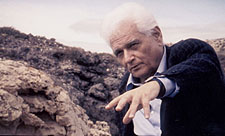An exploration of the life and ideas of Jacques Derrida (1930-2004), arguably…
Sociology is a Martial Art

- Description
- Reviews
- Citation
- Cataloging
- Transcript
If you are not affiliated with a college or university, and are interested in watching this film, please register as an individual and login to rent this film. Already registered? Login to rent this film. This film is also available on our home streaming platform, OVID.tv.
I often say sociology is a martial art, a means of self-defense. Basically, you use it to defend yourself, without having the right to use if for unfair attacks. Pierre Bourdieu
Pierre's Bourdieu's forty books and countless articles represent probably the most brilliant and fruitful renovation and application of social science in our era. The highly influential, at times controversial intellectual--a longtime Professor of Sociology at the College de France--passed away in January 2002.
A 'committed' thinker in the vein of Foucault, his work is concerned with elucidating the processes of symbolic violence and cultural domination in various areas of social life. His most well known book, Distinction (1979), addressed these themes in an effort to overcome the opposition of objectivist (Marxist) and subjectivist (Weberian) theories of class.
In the late nineties he became something of a celebrity scholar, one of the world's most important academics actively associated with the anti-globalization movement. Bourdieu himself argued that scholars and writers could and should bring their specialized knowledge to bear on social and political issues. His powerful critiques of the neoliberal revolution were the natural outgrowth of a lifetime of research into economic, social and cultural class domination among peoples as disparate as Algerian peasants and French professors, and as expressed in everything from amateur photography to posture.
SOCIOLOGY IS A MARTIAL ART, a new documentary about Bourdieu's life, became an unexpected hit in France just prior to his death. Filmed over three years, director Pierre Carles' camera follows Bourdieu as he lectures, attends political rallies, travels, meets with his students, staff, and research team in Paris, and includes Bourdieu having a conversation with Gunter Grass.
The film's very title stresses the degree of Bourdieu's political engagement. He took on the mantle of Emile Zola and Jean-Paul Sartre in French public life, slugging it out with politicians because he considered those lucky enough to have spent their lives studying the social world could not be indifferent to the struggle for justice.
Related Films
Captures the energy and fierce intellect of the man, introducing us to…



